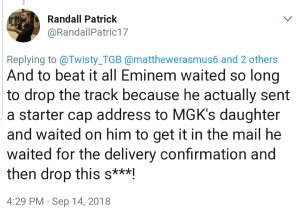All across his 10th album, the more things change, the more Eminem stays the same.
Released without prior announcement, only a
tweet from the rapper saying that he “tried not 2 overthink this 1,”
Kamikazestands in one sense as a no-******** return to basics after the pop-minded bloat of last year’s lackluster
Revival. It’s also the endlessly self-mythologizing star’s latest excoriation of journalists, perceived rivals, and just about anyone else who thinks his music sucks now. His career has become an exhausting feedback loop, and
Kamikaze flies straight into that downward spiral.
Ever since his bedrock trilogy of albums—1999’s
The Slim Shady LP, 2000’s
The Marshall Mathers LP and 2002’s
The Eminem Show—vaulted the battle-tested Detroit MC to a Grammy-winning commercial juggernaut, Eminem has alternated between gritty boom-bap reboots and slick crossover plays as his cultural impact has waned. Like 2009’s grisly
Relapse after 2004’s solipsistic
Encore, or 2013’s violently recidivistic
The Marshall Mathers LP 2after 2010’s clumsily motivational
Recovery,
Kamikaze is Eminem’s latest act of stubbornness in the face of change. Though
Kamikaze might part ways with the polish and Beyoncé-grade guests of
Revival, it’s yet another empty, intermittently tone-deaf onslaught of technical rap prowess and humorless juvenilia from an artist who once controlled the zeitgeist with ease.
If rap more closely resembled a purely athletic contest, Eminem would still be an Olympian. As a deployer of internal rhyme schemes and sly vocal deliveries, he continues to operate on a rarefied plane, whether spitting in frenetic double-time or sending up today’s sing-songy approaches. “Get this ****in’ audio out my Audi yo, adios,” he declares on opener “The Ringer,” stringing together something textually clever but utterly meaningless. And when Eminem repeatedly insists he writes his own lyrics, well, what an accomplishment. If what happened with JAY-Z’s likewise-crotchety “D.O.A. (Death of Auto-Tune)” back in 2009 is any guide, Eminem’s hyper-articulate attacks on mumble-rap might mark not the death of a trendy style as much as its inescapable takeover. When Eminem compares himself to Muhammad Ali, on a joylessly bludgeoning track titled, yes, “Greatest,” the breathless wordplay sounds like it would be a lot of work to duplicate, but he seems to miss out on what’s remarkable about both Ali and, at its best, music. Eminem doesn’t do transcendence.
While Eminem’s verbal dexterity has remained intact, his shortcomings have grown more glaring with the passage of time. When he isn’t unleashing his id, he has, at times, veered toward power-ballad treacle, and “Stepping Stone,” a maudlin tribute to his former group D12, is the prime offender here. When the demons do emerge, the songs aren’t memorable enough to overcome the latest tinges of homophobia and misogyny from a 45-year-old who either knows better or is outrage-trolling for the attention he doesn’t need. Instead of trying to evolve with the culture, he’d rather Make Rap Great Again. On the execrable “
Fall,” which has already been
disowned by guest vocalist Justin Vernon, Eminem carelessly lobs an anti-gay slur at Tyler, the Creator. Multiple references to domestic violence, on two separate tracks, fail to earn their jokey presence. And while Eminem has long delighted in being impish, the many times
Kamikaze presents the idea of someone having a **** in their mouth as the ultimate insult is not only socially dubious but artistically bankrupt and above all: boring. No-holds-barred wordplay is part of hip-hop’s DNA, but this isn’t a reissue from another era or grassroots subcultural expression; it’s a rich and famous and not coincidentally white, straight man in 2018, asserting that he’s about to “rape the alphabet.”
When Eminem complains in one breath about how he wasn’t duly rewarded for an
anti-Trump freestyle he did last year, and in the next takes the Trump-like step of labeling the media as his enemy, it’s hard to tell whether his obtuseness is willful or just clueless. In one skit, he goes so far as to intimate that he’s driving to a critic’s house, which
isn’t really funnyanymore, either. For all of Marshall Mathers’ perpetual outsider posturing,
Kamikaze is a tie-in with the upcoming movie
Venom, an offshoot of the multibillion-dollar
Spider-Man franchise. “Venom,” the closing track, is a rousing-enough recap of Eminem’s career arc, with appropriately slithery rhyme patterns, told through the Marvel story’s device of an alien entity that can enter someone’s bloodstream and become a part of them forever. It hints at how much Eminem might have to gain if he could stop being defensive about his legacy and settle into becoming a legacy act. Ditch the new songs with their schtick and it’d be a perfect late-career highlight to include in a Super Bowl halftime show we might one day endure or a Las Vegas residency he might one day settle for.

 Em spits 30 bars directed at MGK and it isn’t a diss?
Em spits 30 bars directed at MGK and it isn’t a diss?

















